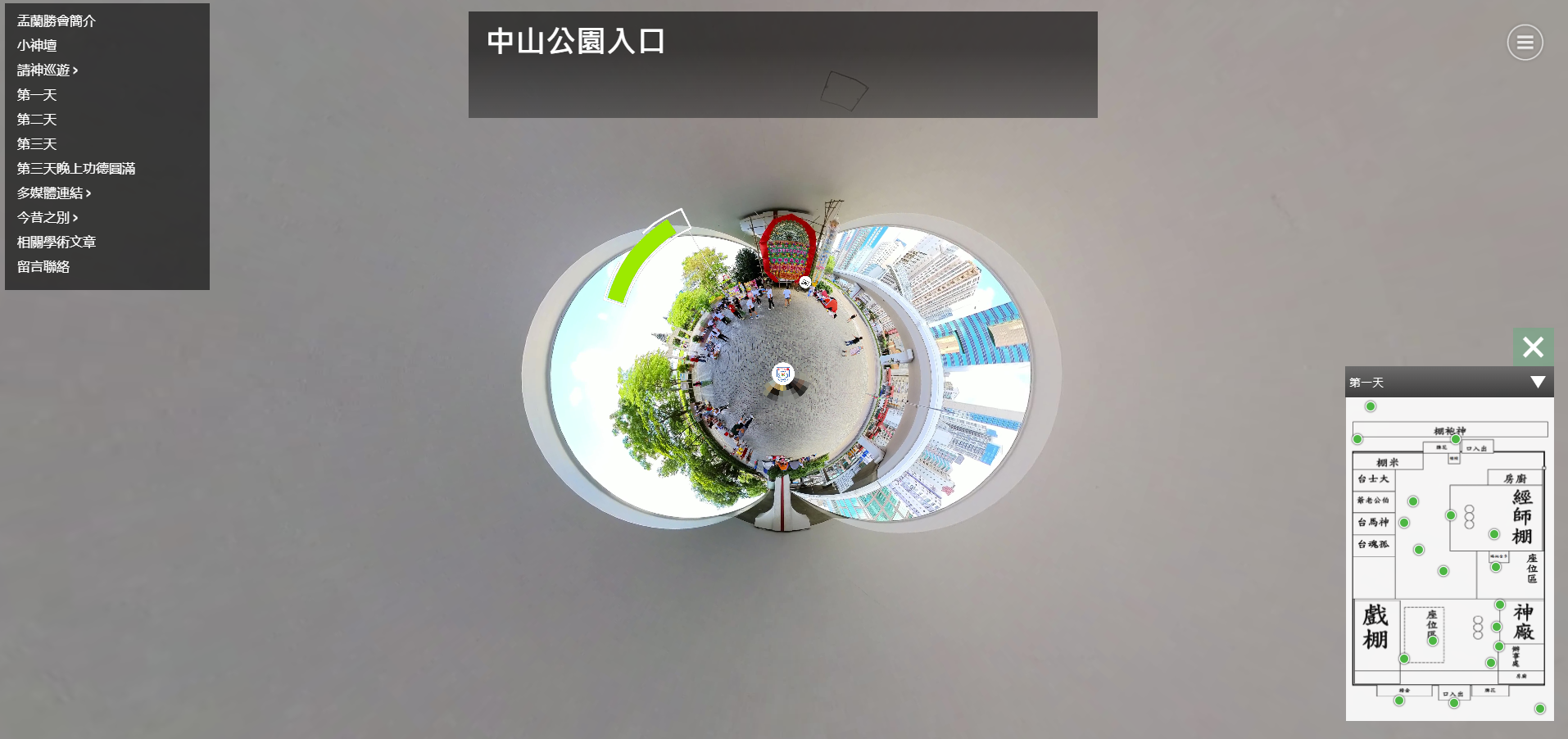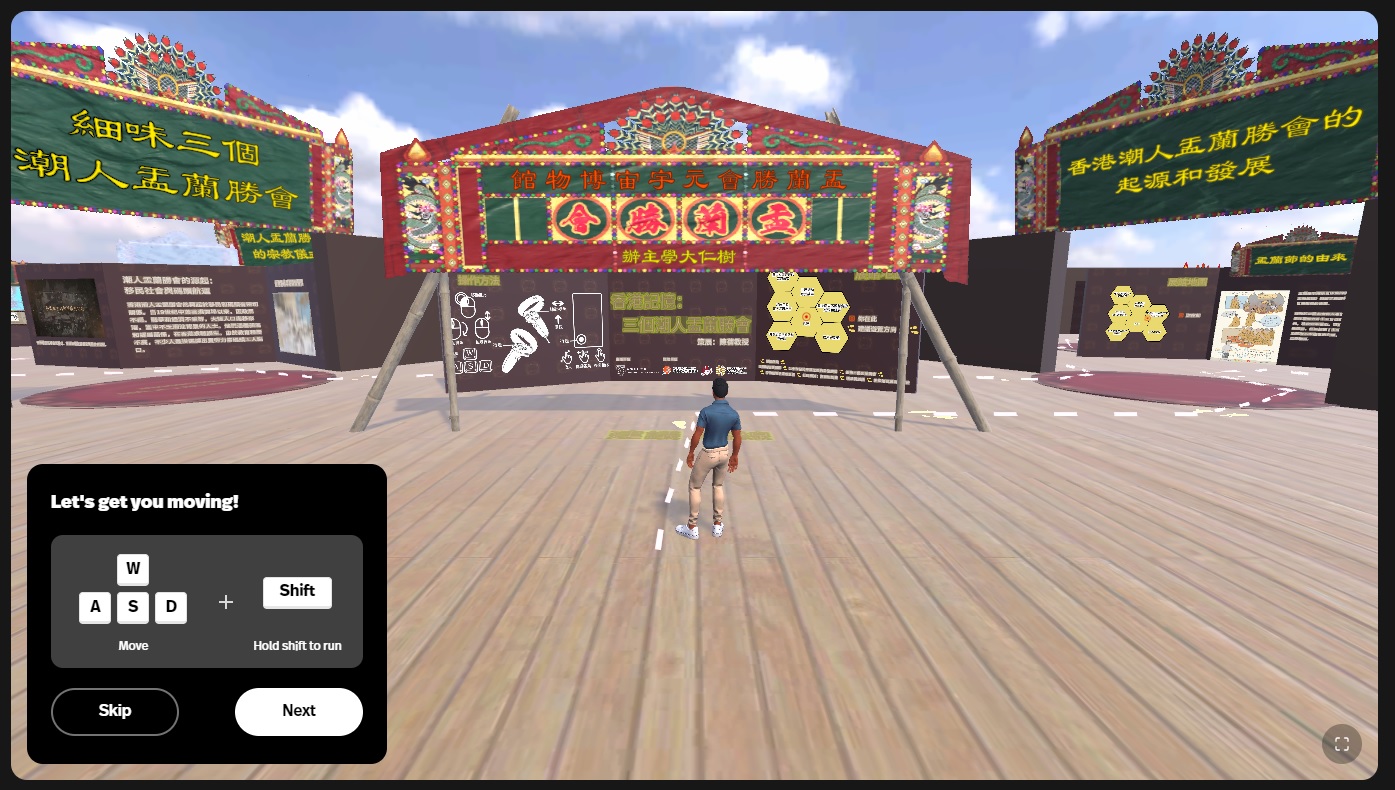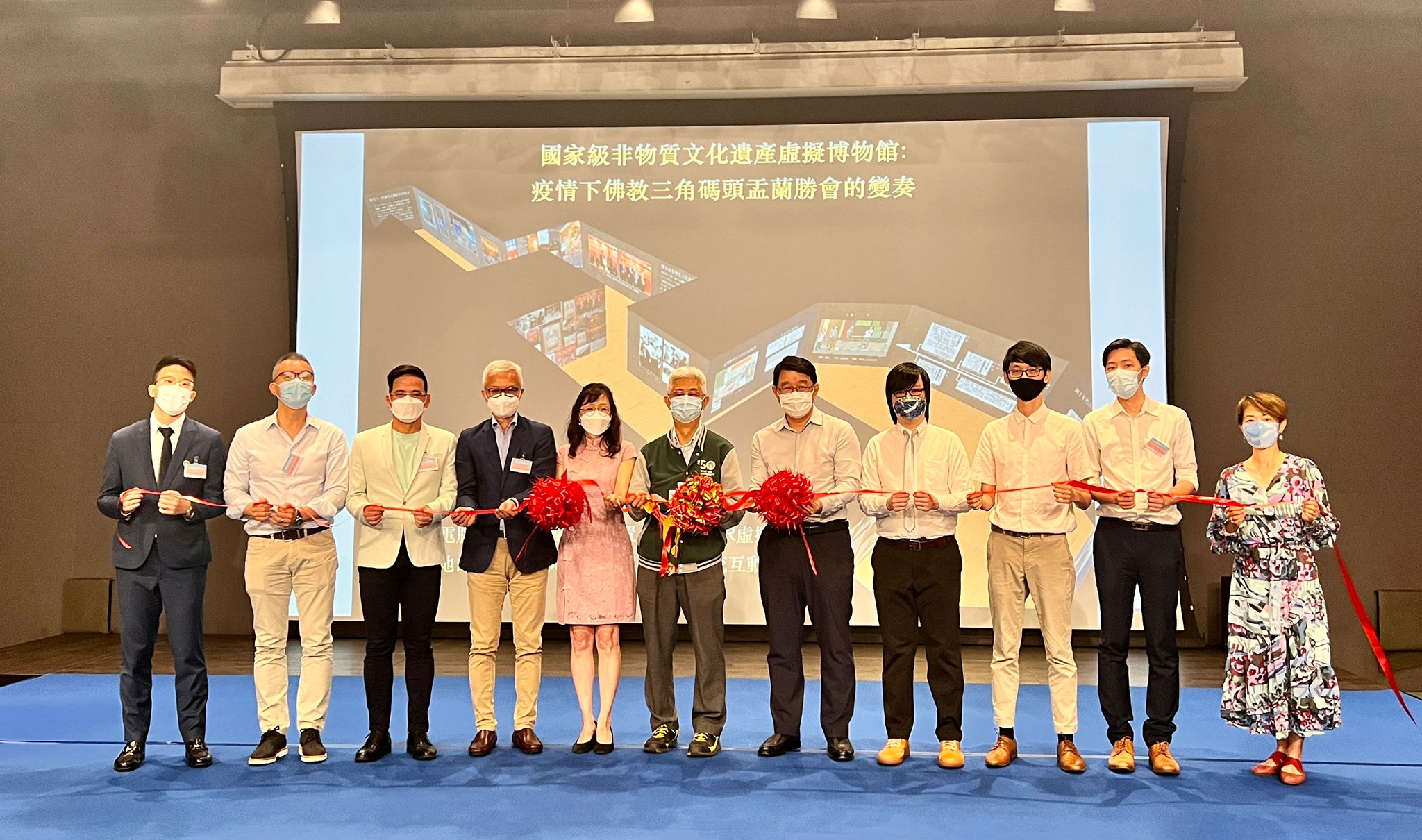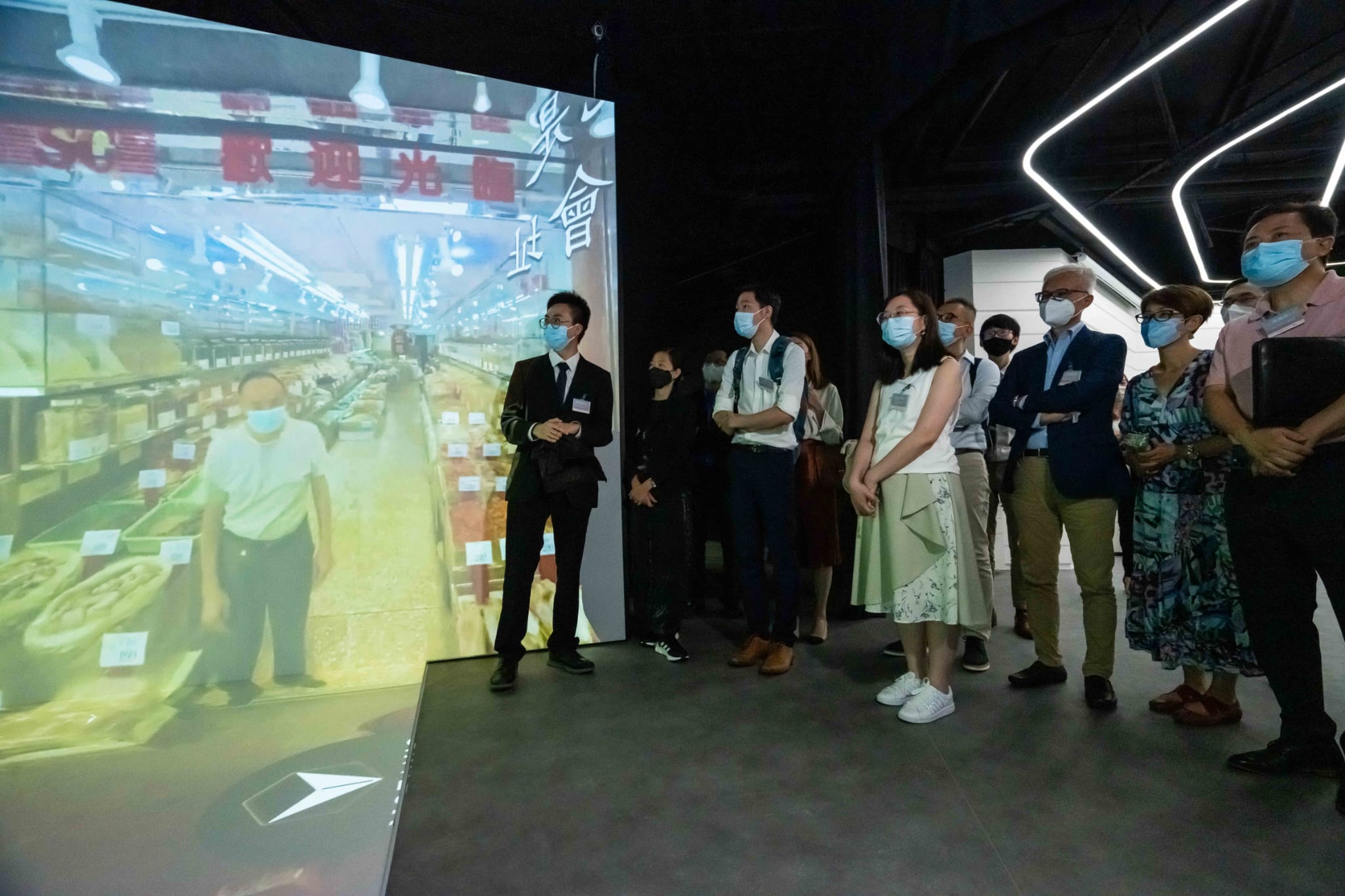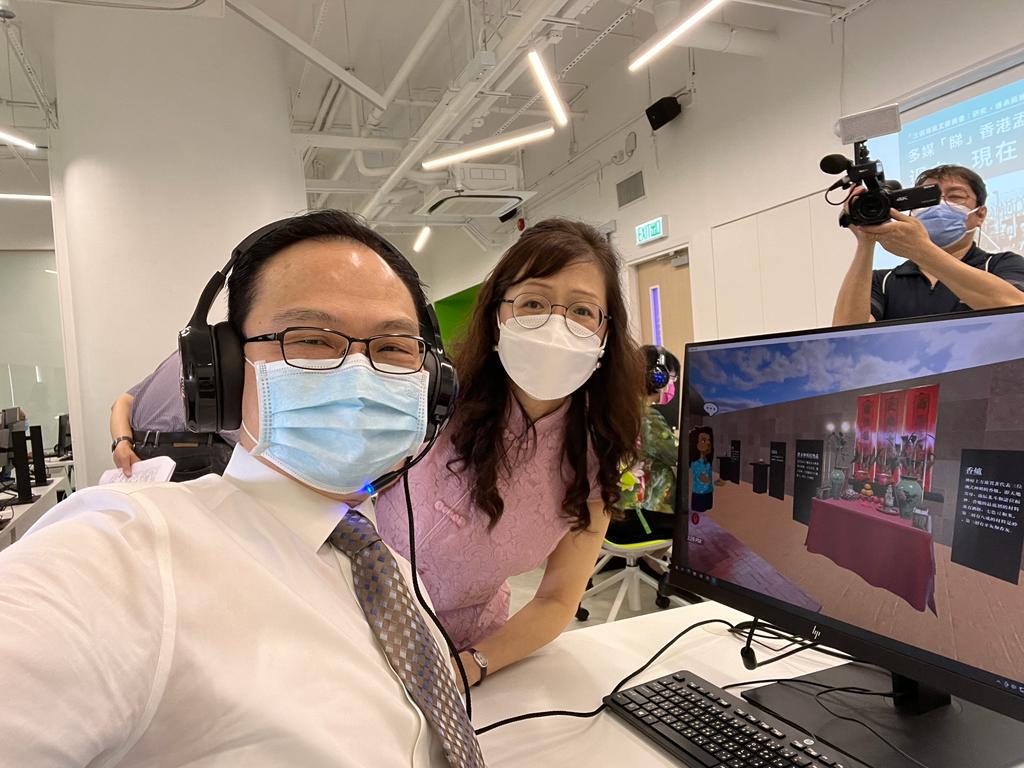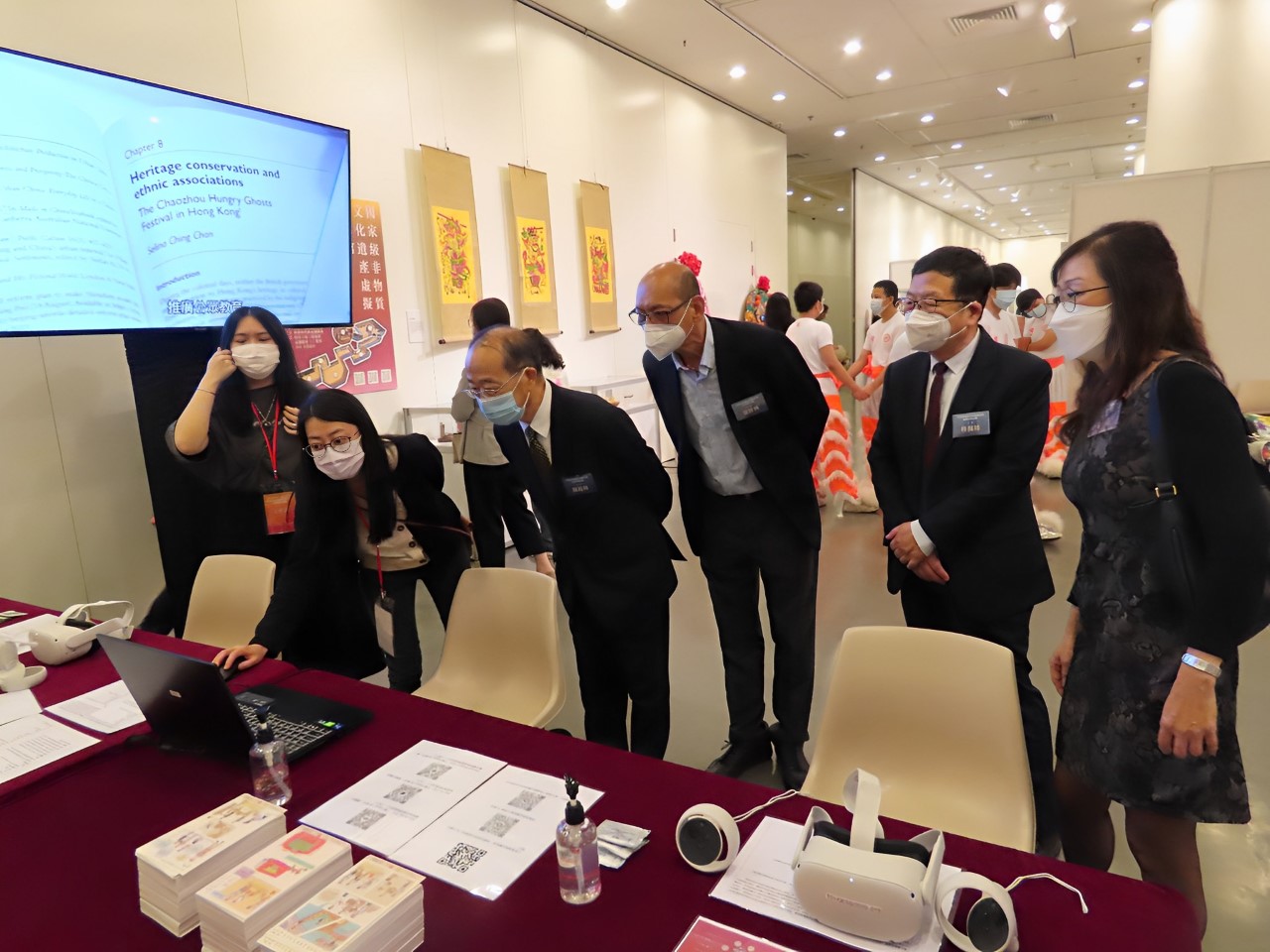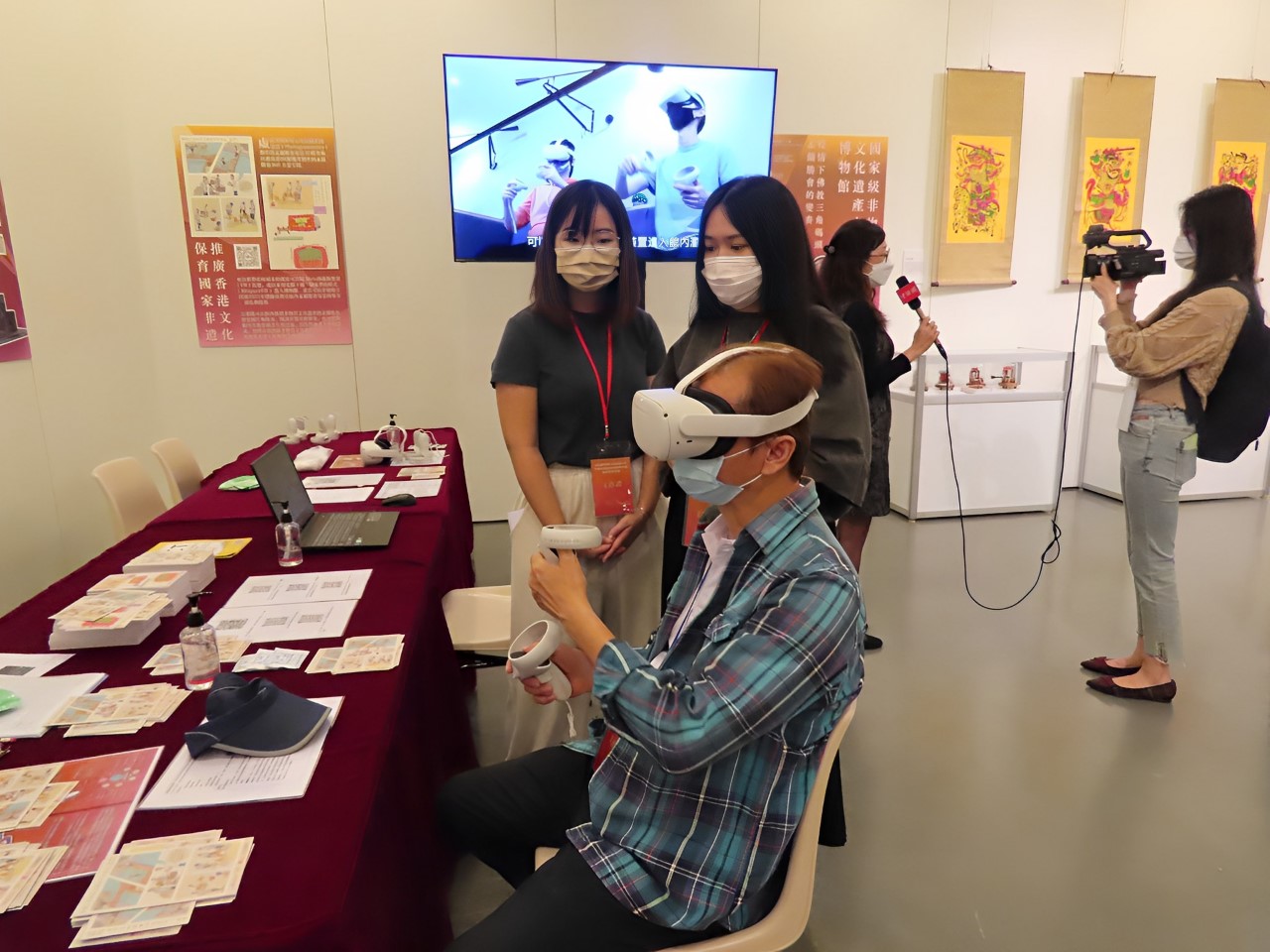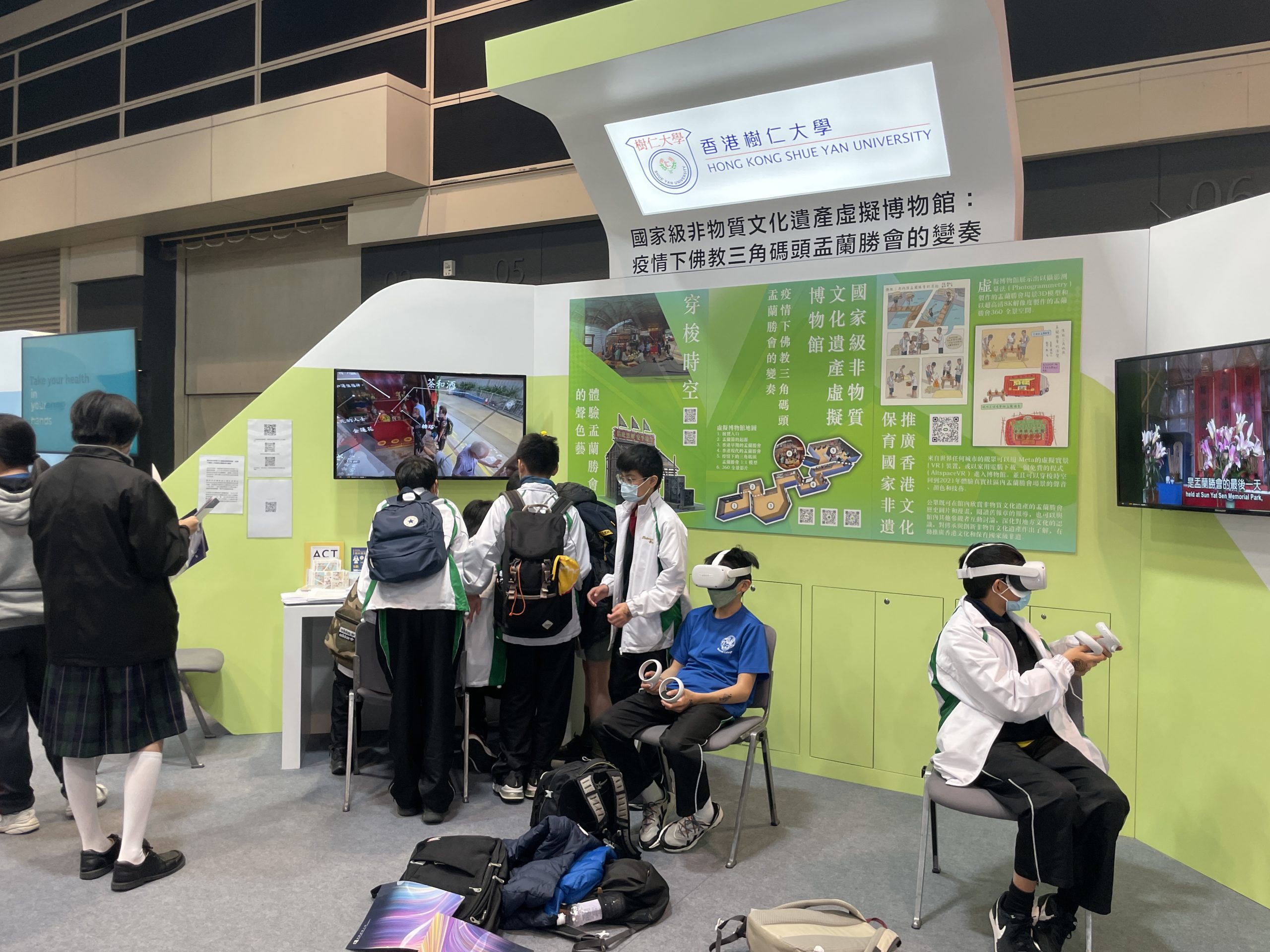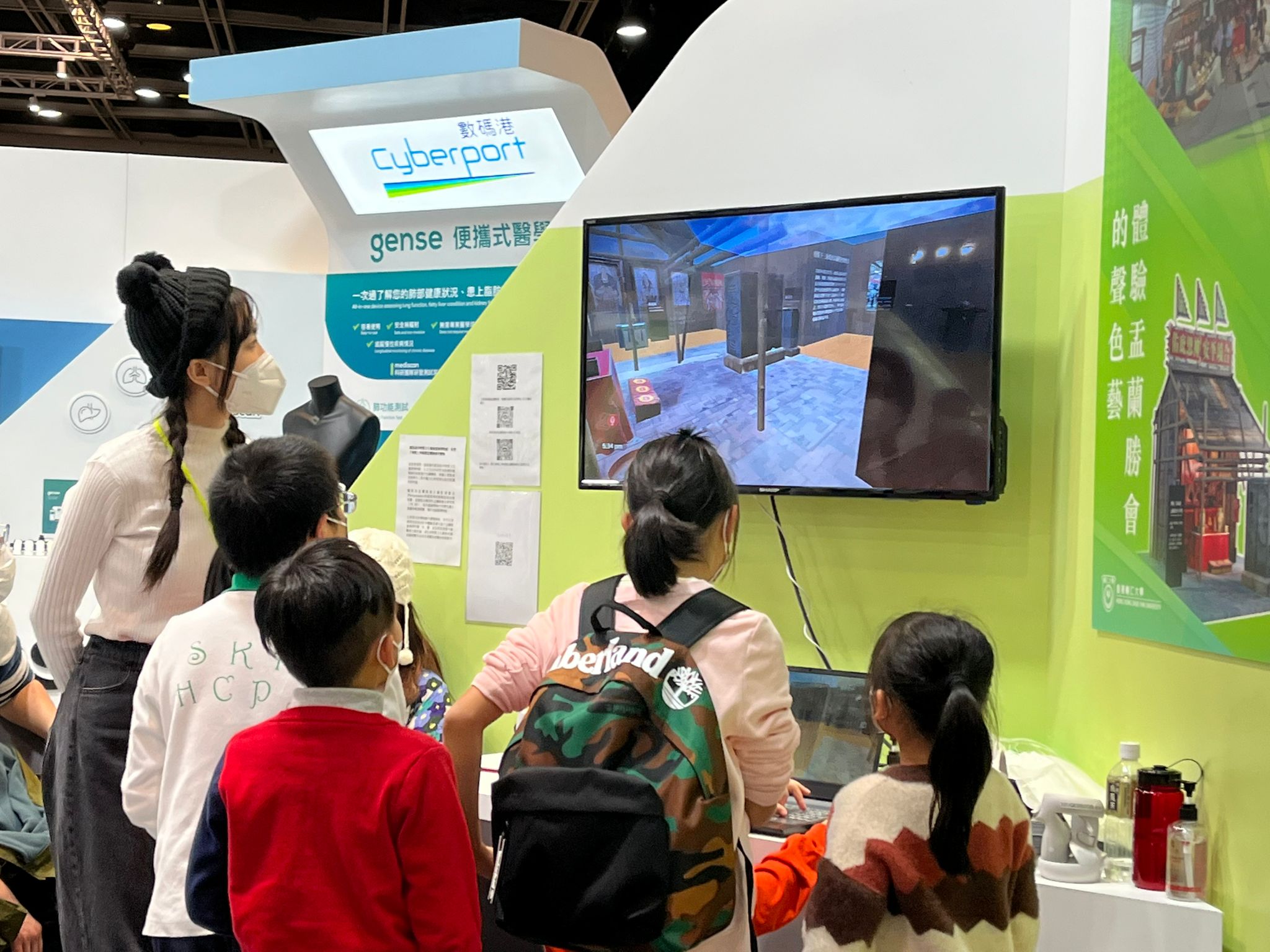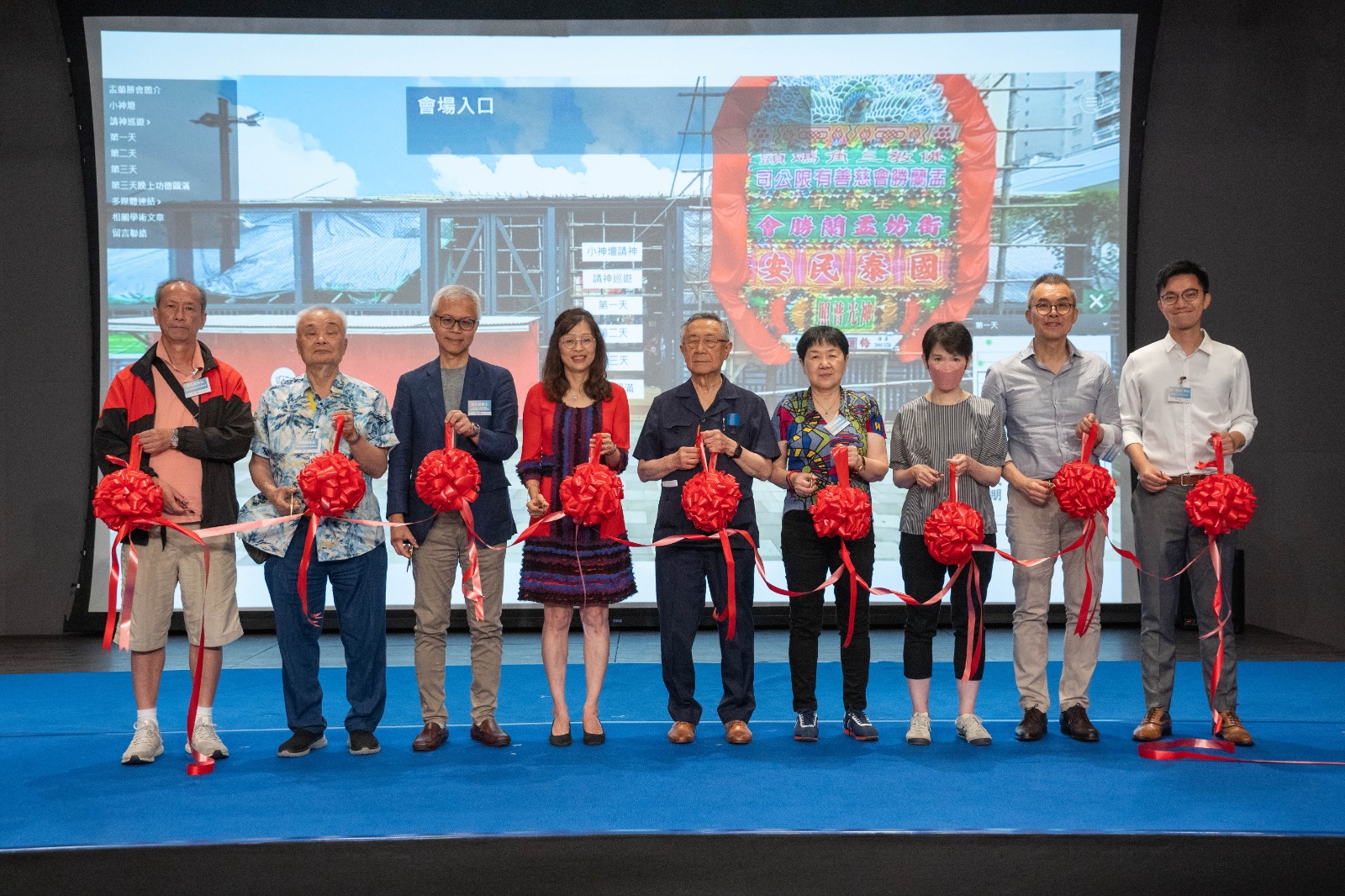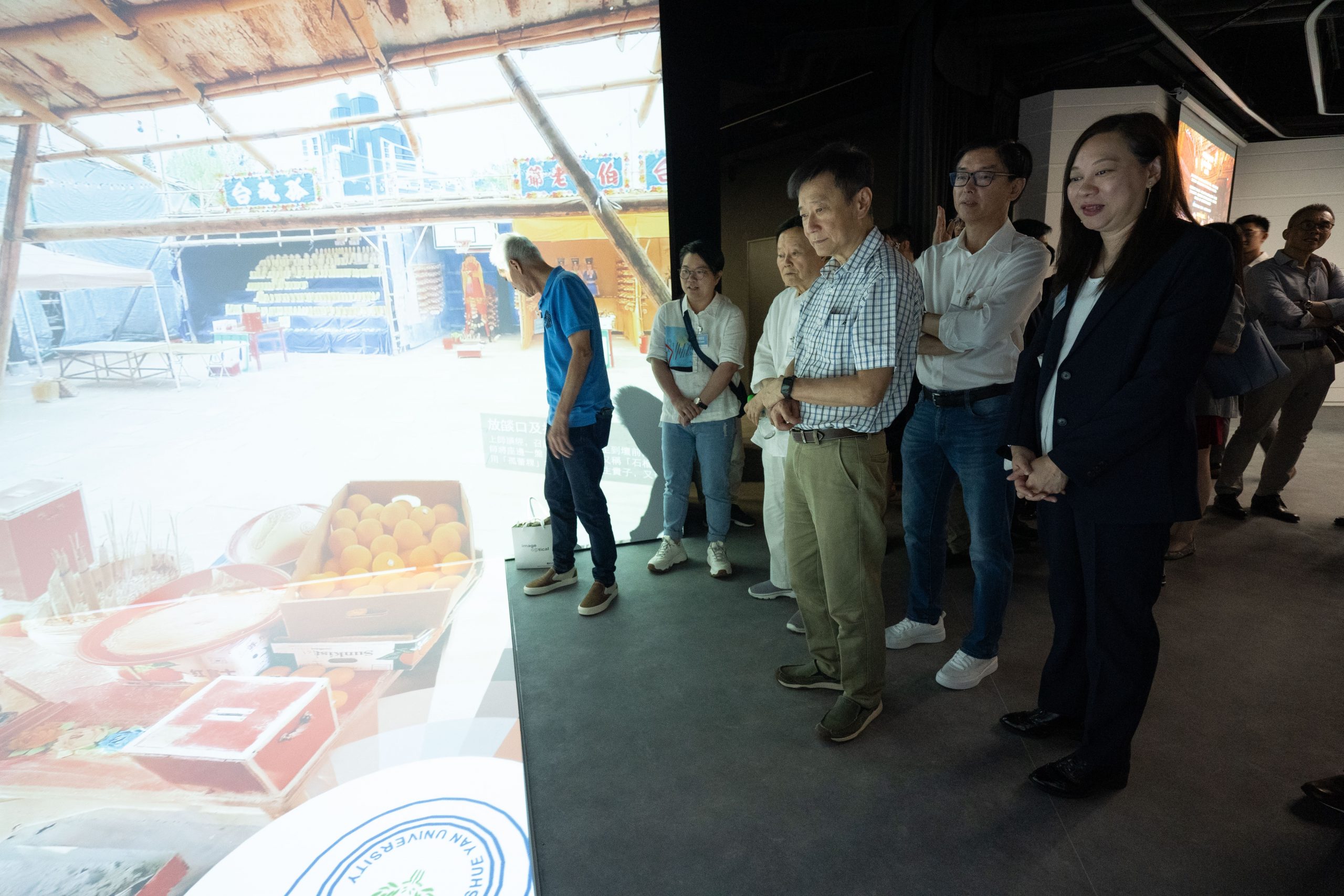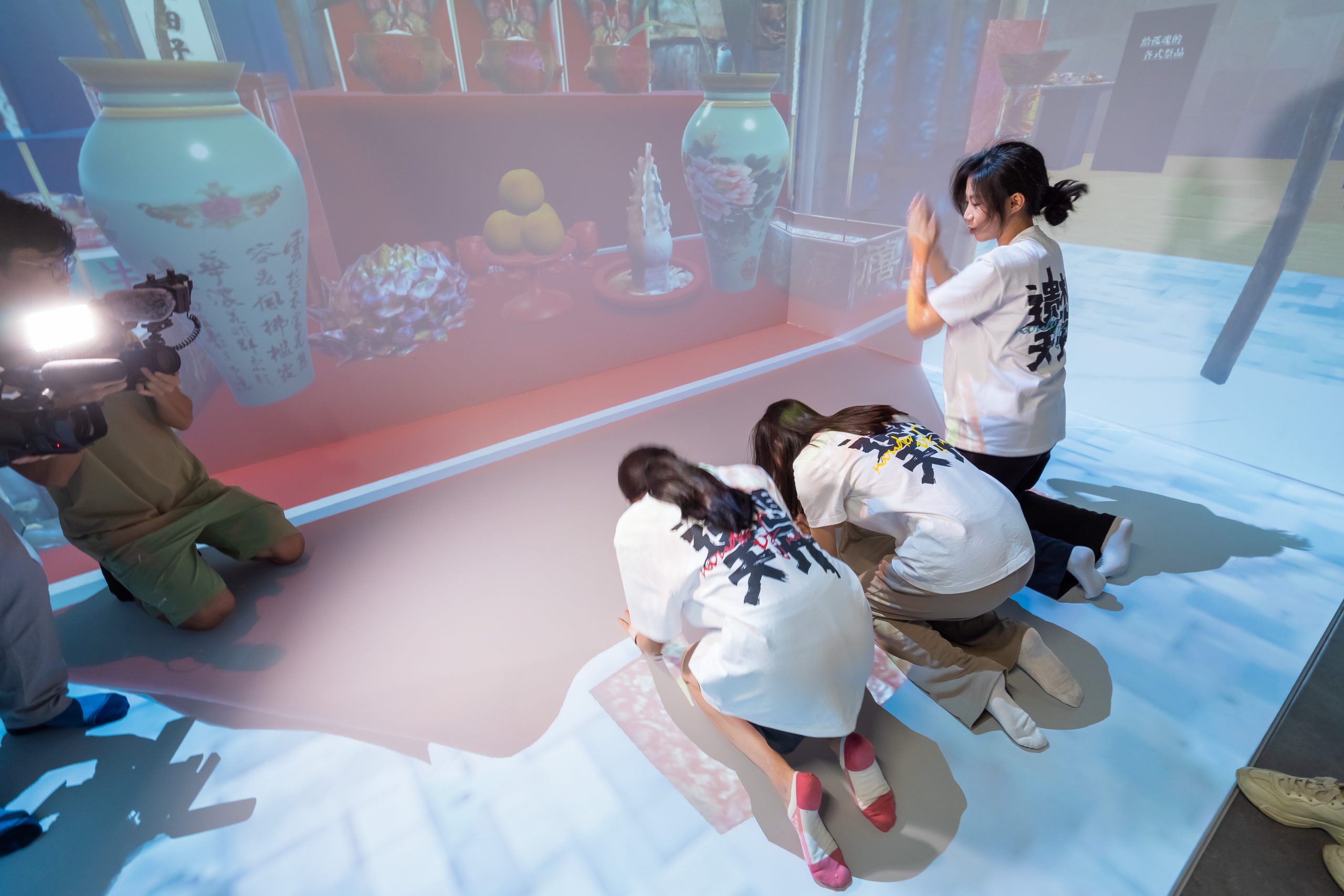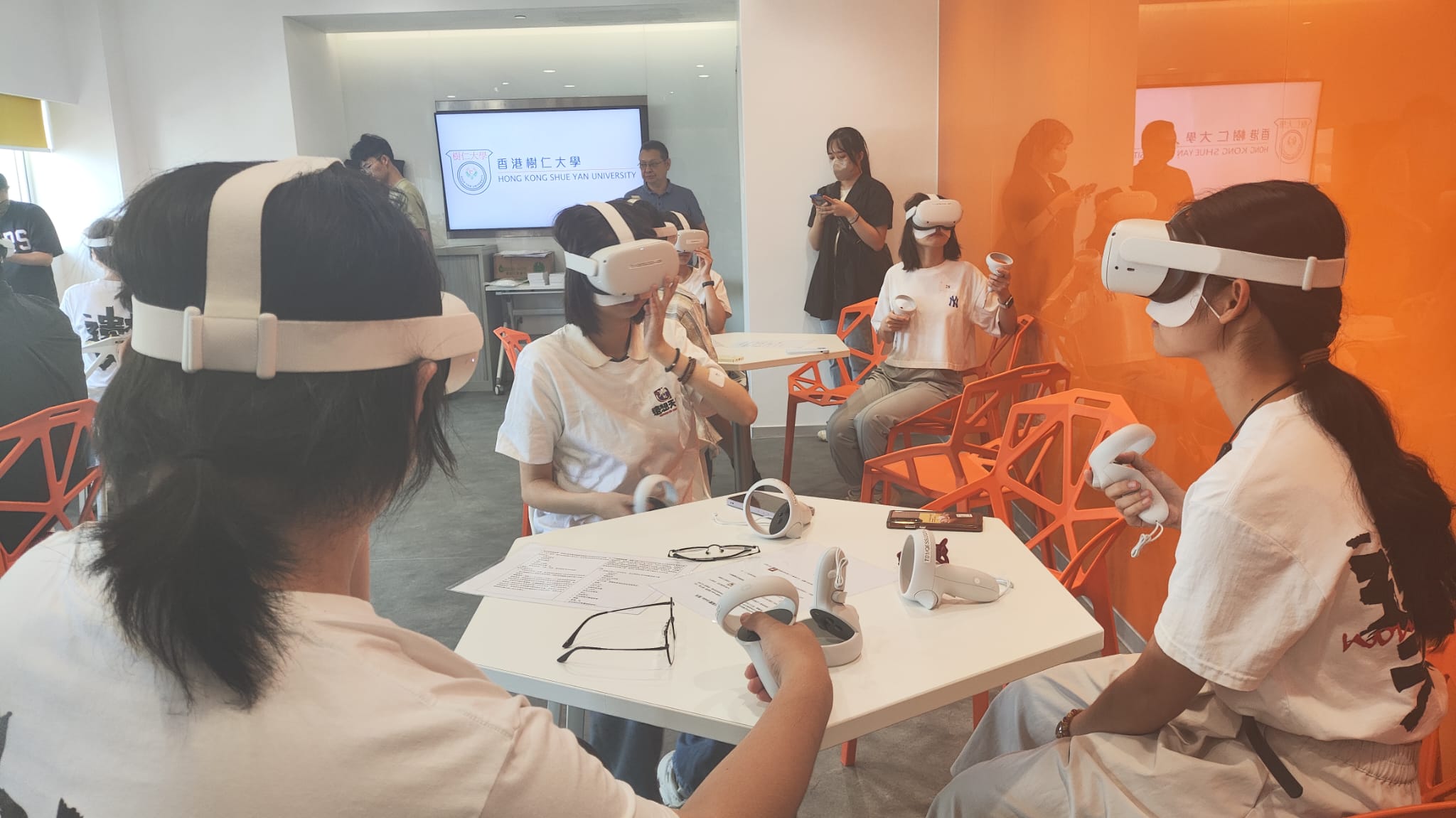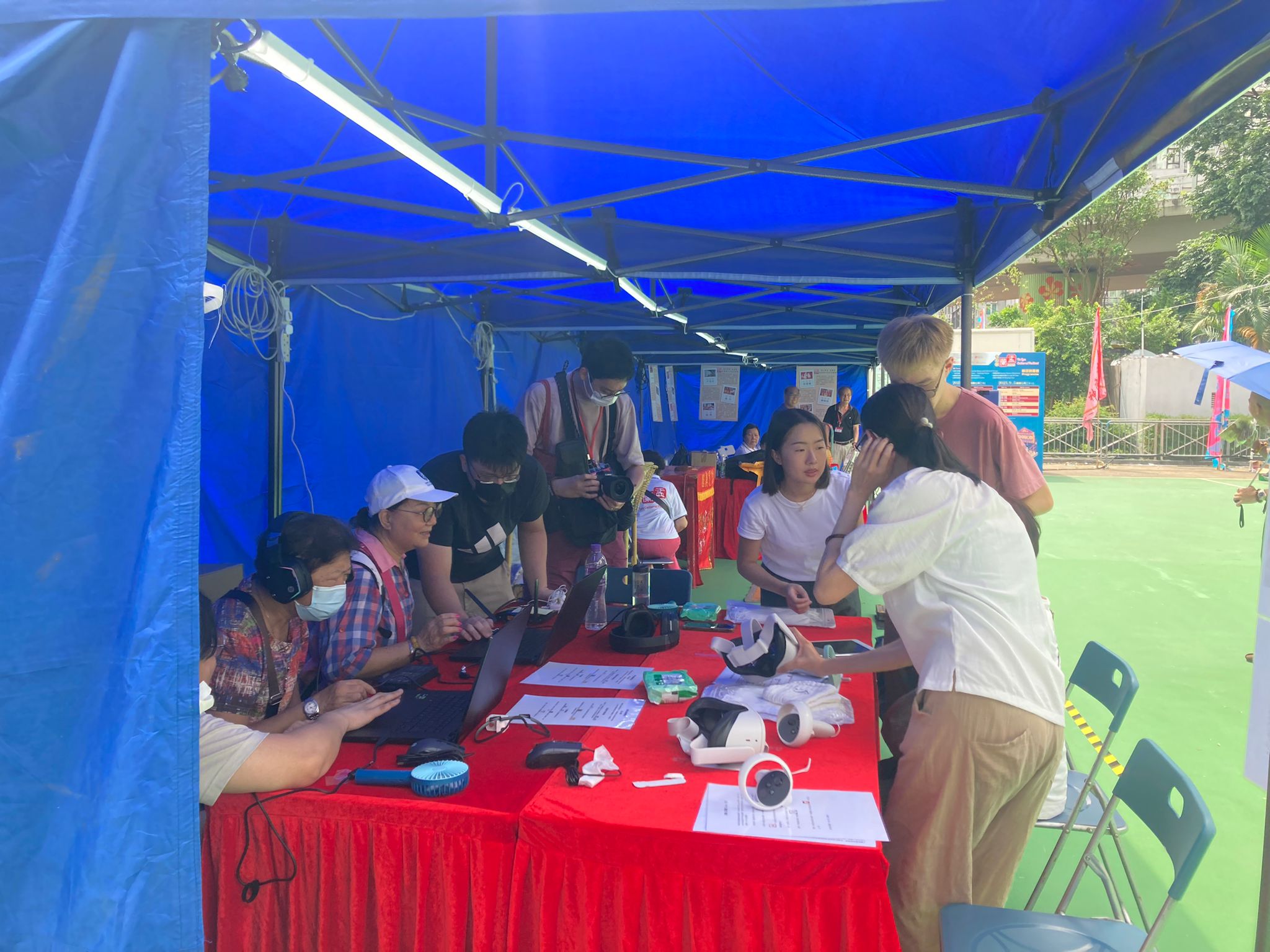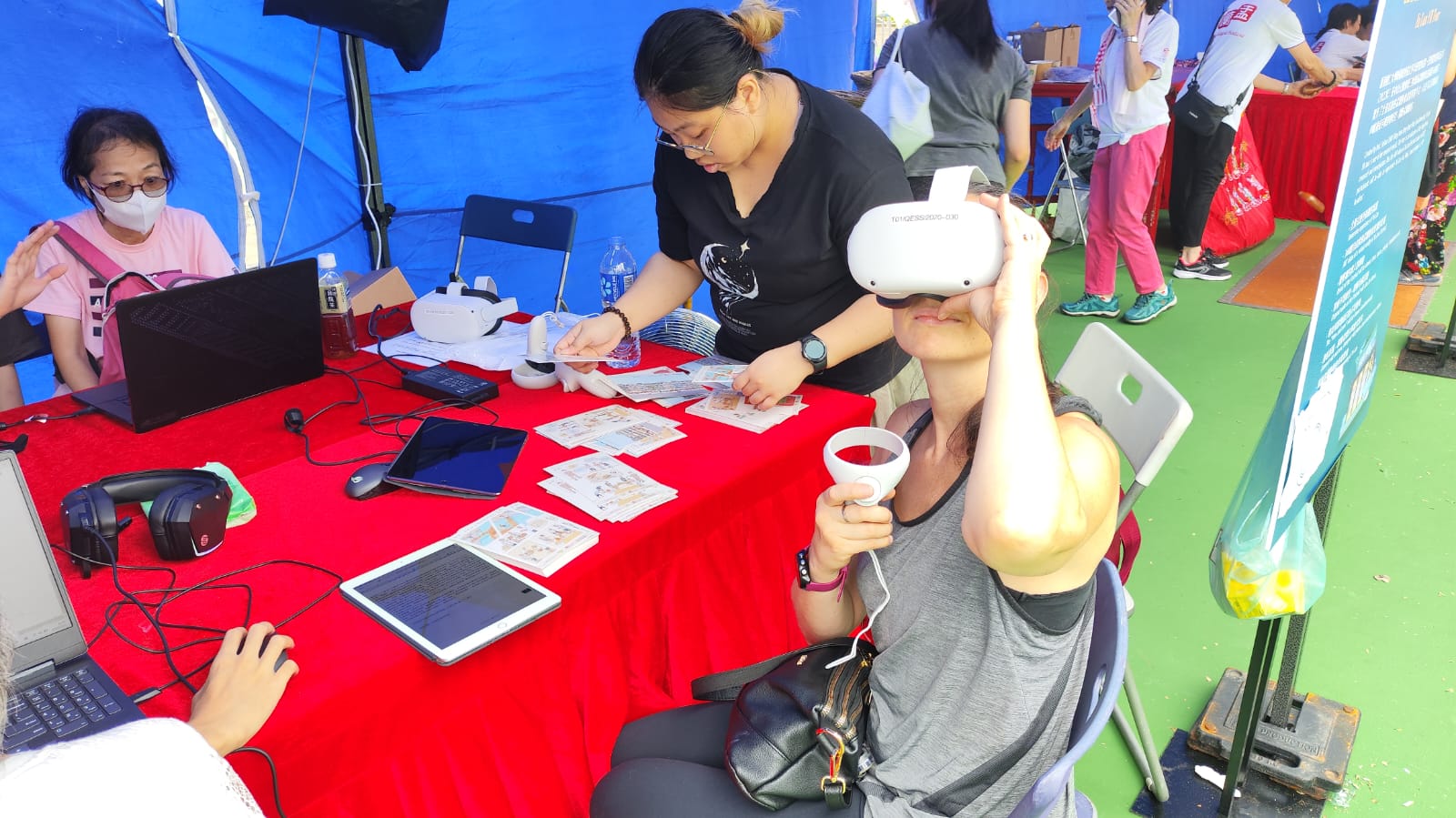Recent Research Projects
“Three Chaozhou Hungry Ghosts Festival: Research and Promotion”
Funded by the Intangible Cultural Heritage Office, HKSAR Government Amount of Grant: HK$1,004,400

Project Description:
The project will record and analyze features in the Festival that are considered as intangible cultural heritage. Besides studying and documenting the process of organizing the Festival, site layout and use, contents of the religious ceremonies, performance of Chiu Chow operas, techniques of bamboo shed theatre building, and paper crafting, the project also analyzes how Hong Kong’s collective memories and economic history are embedded in the Festival. A virtual Yulan museum will be constructed to display research findings and provide a virtual tour. A documentary and video clips of the Yulan Festival will be displayed on the virtual museum’s website, as well as comic strips, animations, drawings, old photos, and texts. There will be virtual guided tour services of the Yulan Festival, which will allow visitors to interact with the environment, as well as explore and experience a ceremony or artefacts.
Deliverables
360-degree Yulan Virtual Tour:
A Novel Approach of Documenting Intangible Cultural Heritage
This project used the 360-degree video technology to document a Yu Lan festival that occurred in 2022 and then curated the collected video clips to recreate a virtual tour of the Yu Lan festival celebration, accessible via desktop or VR. The virtual tour aims to capture the festival as an occasion where different activities are going on (e.g., opera performance, religious rituals, and offerings preparations) and also as a spectacle performed and participated by various people (e.g., devotee, Yu Lan organisers/staff, visitors). It encourages visitors to experience the ‘festival’, uncover its different aspects, perceive the emotions and communal spirits embedded in the celebration.
Enter to the Virtual Tour:https://yulanvrtour22.hksyu.edu/
Short Video: https://www.youtube.com/watch?v=E9fJthI77og
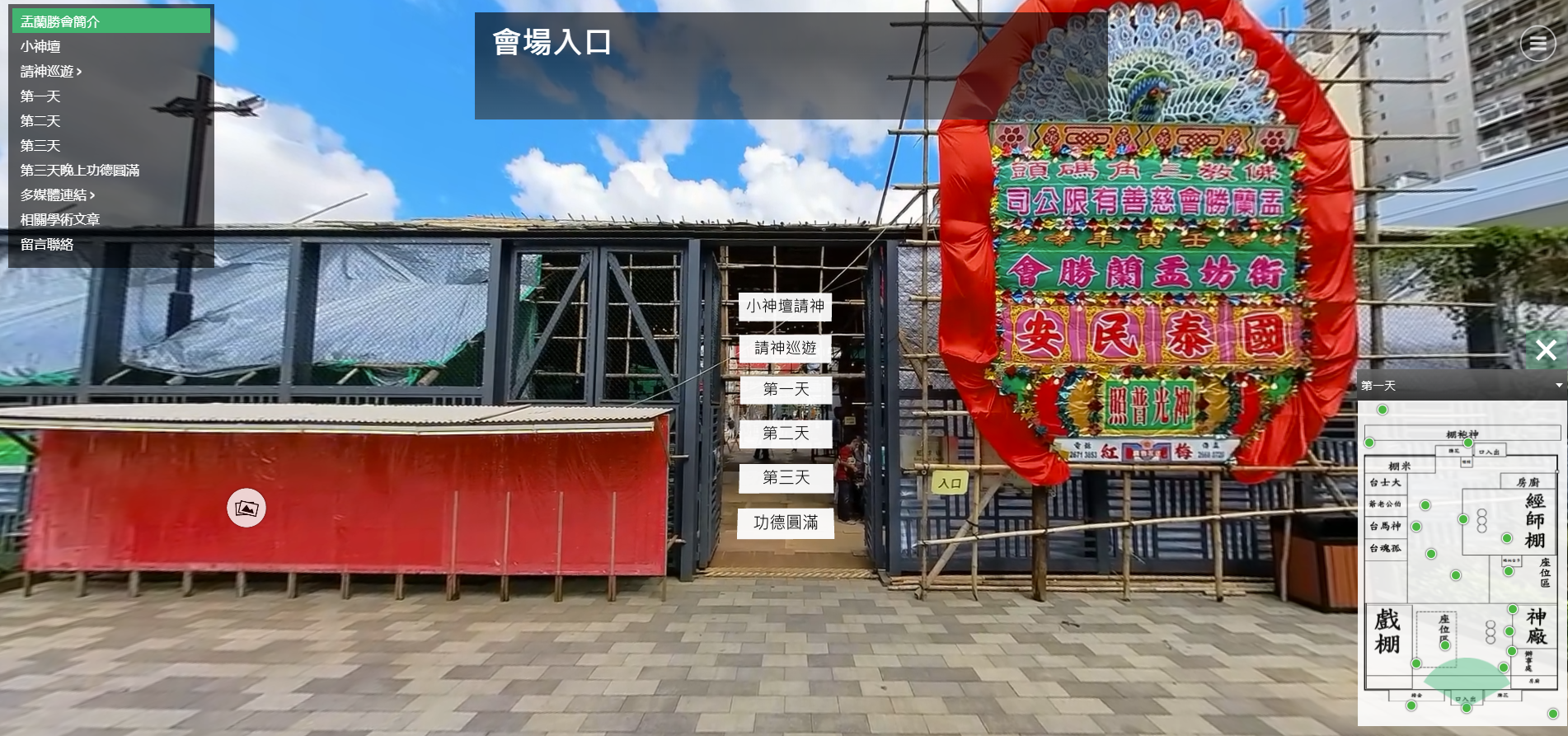
Virtual Museum(Phase 1)
With the support of Quality Enhancement Support Scheme and Intangible Cultural Heritage Office, Professor Selina Ching Chan and her team developed a “Virtual Museum of National Intangible Cultural Heritage: Adaptation of Buddhist Sam Kok Pier Hungry Ghosts Festival under COVID-19 Pandemic.” This is the first virtual museum for intangible cultural heritage in Hong Kong. By utilizing research findings and digital technology, the virtual museum(Phase 1) aims to transfer knowledge, promote public education, and enhance the public understanding of local communities and identities. This project also demonstrates how Hong Kong Shue Yan University performs public education on Chinese heritage and reinvents Liberal Arts University education through research-informed, technology-enhanced teaching.
Here are some additional related videos:
- A quick video (34 seconds) of the virtual museum(Phase 1): https://www.youtube.com/watch?v=v39o90vvk_k&ab_channel=QESSHKSYU
- Take a quick look at a short video (6 mins) of the virtual museum(Phase 1): (國家級非物質文化遺產虛擬博物館:疫情下佛教三角碼頭盂蘭勝會的變奏 :https://www.youtube.com/watch?v=PKx3pGLqqNc
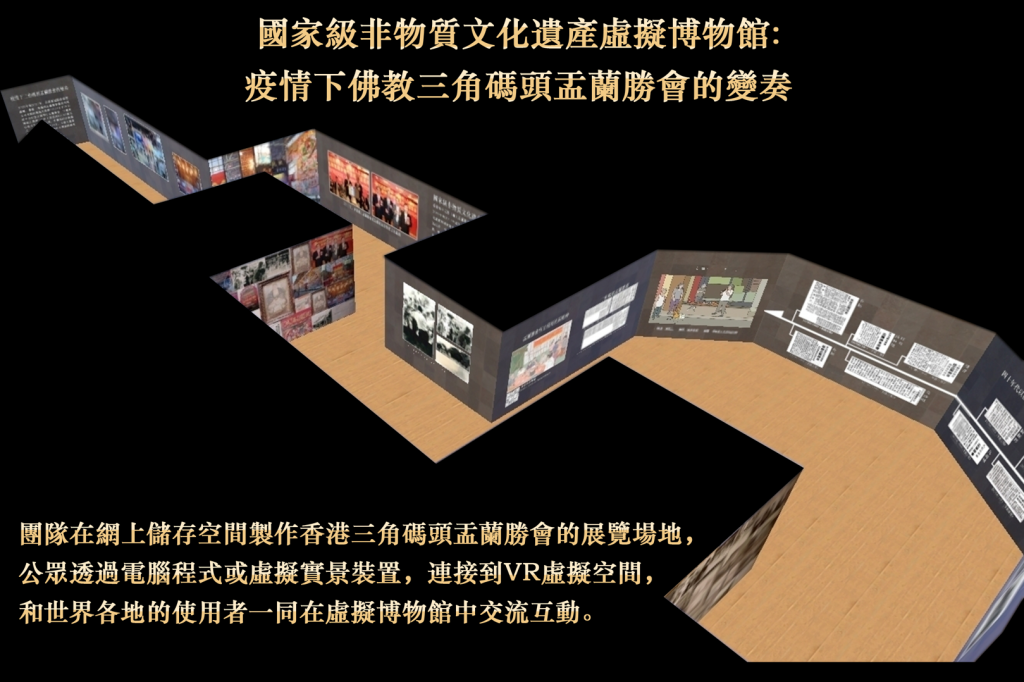
The audiences from different parts of the world may enter the virtual museum (Phase 1) as avatars and will be able to interact with each other, e.g. engage in tutorial discussion and take selfie. Max: 30 people enter the museum at the same time.
If you are interested to visit the virtual museum (Phase 1), please click the link: Yulan Virtual Museum (Phase 1)
Acknowledgments:
非物質文化過產辦事處,新傳網,南華早報出版有限公司,何鴻毅家族香港基金,香港歷史博物館,夢周文教基金會,佛教三角碼頭盂蘭勝會有限公司
Virtual Museum(Phase 2)
With the funding support of Intangible Cultural Heritage Office, Professor Selina Ching Chan constructed a Virtual Museum, Hong Kong Memory: Yulan Festival.
If you are interested to visit the virtual museum (Phase 2), please click the link: Yulan Virtual Museum (Phase 2)
A video of the virtual museum(Phase 2): https://www.youtube.com/watch?v=-lYmYS0wGnU&feature=youtu.be
Acknowledgments:康樂及文化事務署及非物質文化遺產辦事處;郭沐信先生、陳運然先生、連克兢先生;馮志成先生、馬香信先生;蔡學勤先生;田仲一成教授;香港大學圖書館;香港大公文匯傳媒集團;何鴻毅家族香港基金;政府檔案處歴史檔案館;長春社文化古蹟資源中心;佛教三角碼頭孟蘭勝會慈善有限公司;尖沙咀官涌街坊孟蘭勝會;潮州公和堂;蘇敏怡小姐;香港中文大學圖書館;南華早報出版有限公司;日本國立國會圖書館;政府新聞處圖片資料室;香港歷史博物館;胡炎松先生;
3D model of the temporary altar
Click here for a quick view of the 3D model of the temporary altar displayed in the virtual museum (Phase 1).See animations displayed in the virtual museum(Phase 1) below.
三角碼頭盂蘭勝會神棚 (2022)
尖沙咀官涌街坊盂蘭勝會 (2023)
尖沙咀街坊盂蘭勝會司機神棚 (2023)
尖沙咀街坊盂蘭勝會工商神棚 (2023)
神馬棚 (2023)
大士臺 (2023)
神袍棚 (2023)
Hong Kong’s Chaozhou(Chiuchow)Hungry Ghosts Festival in Covid-19 Pandemic: Buddhist Sam Kok Mar Tou
full link to video:
https://youtu.be/-n_enlbdGV0
Hong Kong’s Chaozhou(Chiuchow)Hungry Ghosts Festival in Covid-19 Pandemic: Chiuchow Kung Wo Tong Friendly Association
full link to video:
https://youtu.be/iolJYnXRX3c
2023尖沙咀官涌街坊盂蘭勝會 (360影片)(農曆七月廿四至廿六)
full link to video:
https://youtu.be/09zmdNIdxNA
對應YouTube片段播放的時間點:
| 第一天: | 第二天: | 第三天: |
| 00:00 尖沙咀盂蘭勝會會場(一) | 14:00 經師在神棚前誦經 | 33:07 籌辦者拜祭神明 |
| 01:46 召大士、召孤魂 | 15:53 善信拜祭 | 38:50 工商盂蘭勝會會員拜祭 |
| 04:33 走供儀式 | 16:57 金山十獻(一) | 39:18 仙姬送子 |
| 07:15 司機神棚 | 18:48 金山十獻(二) | 40:58 派米 |
| 08:20 工商神棚 | 24:44 走五土或走供 | 43:52 放燄口及拋孤蕾粿(一) |
| 10:00 盂蘭勝會神棚 | 27:50 尖沙咀盂蘭勝會會場(三) | 43:52 放燄口及拋孤蕾粿(一) |
| 11:01 辦事處 | 28:31 潮劇演出 | 48:35 放燄口及拋孤蕾粿(二) |
| 11:57 神袍棚 | 31:52 工商盂蘭勝會會員擲聖杯競投福品 | 53:59 功德完滿(一) |
| 13:01 尖沙咀盂蘭勝會會場(二) | 58:45 尖沙咀盂蘭勝會會場(四) | |
| 59:37 走散旗 | ||
| 01:02:10 禮斗儀式 | ||
| 01:05:08 尖沙咀盂蘭勝會會場(五) | ||
| 01:05:49 功德完滿(二) | ||
| 01:07:53 送神儀式 |
2022香港佛教三角碼頭盂蘭勝會 (360影片)(農曆七月廿四至廿六)
full link to video:
https://youtu.be/LjDq3vFHP2A
對應YouTube片段播放的時間點:
| 第一天: | 第二天: | 第三天: |
| 00:00 皇后街干諾道西交界小神壇:請神一 | 11:08 神袍棚:給神明穿戴的大神袍 | 14:32 金山十獻儀式 |
| 02:25 請神二 | 12:31 戲棚 | 15:15 善信和大會祭拜先人和孤魂 |
| 04:14 神明到達西區中山公園盂蘭勝會會場 | 15:54 各類祭品供先人和孤魂享用 | |
| 09:28 西區中山公園盂蘭勝會會場入口 | ||
| 09:49 佛教三角碼頭盂蘭勝會會場縱覽 |
Sam Kok Mar Tou Hungry Ghost Festival (Yulan) 2021
full link to video:
潮籍盂蘭勝會的宗教意義
盂蘭最早傳承自印度的佛教,《佛說盂蘭盆經》記載了釋迦牟尼佛的弟子目連救母的故事,講述目連的母親生前做了錯事,死後墮入惡道飽受折磨。後來用盆子裝滿百味五果供養佛陀和僧侶,拯救墮落在惡道的眾生,成功救母親脫離苦海。
目連救母的故事
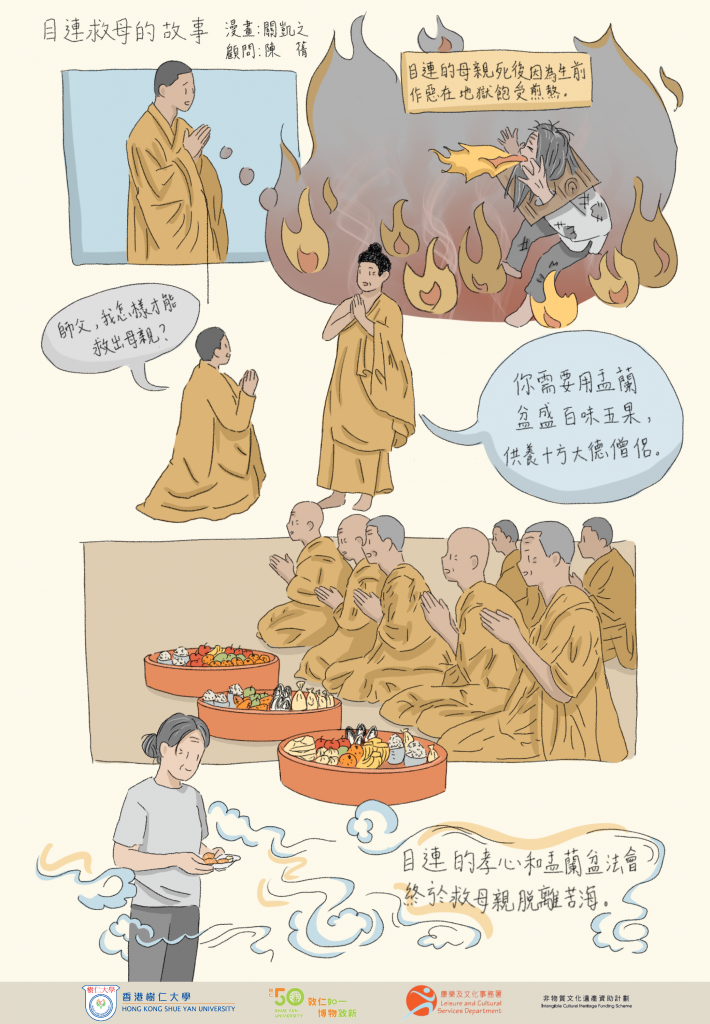
昔日每逢農曆七月,市民紛紛在住處門口的街上進行燒衣和拜祭活動
潮籍盂蘭勝會的宗教意義
潮籍盂蘭勝會與香港早期轉口貿易港的發展
據不少潮籍受訪者表示,戰前已有不少移民至香港的潮籍人士聚集在上環、西環、尖沙咀或銅鑼灣等一帶的碼頭範圍,從事苦力的勞動工作。這群苦力就是籌辦本港歷史悠久的盂蘭勝會的先驅者,他們分別發起籌辦佛教三角碼頭街坊盂蘭勝會、尖沙咀官涌街坊盂蘭勝會、潮州公和堂盂蘭勝會。
早期碼頭 (港口)
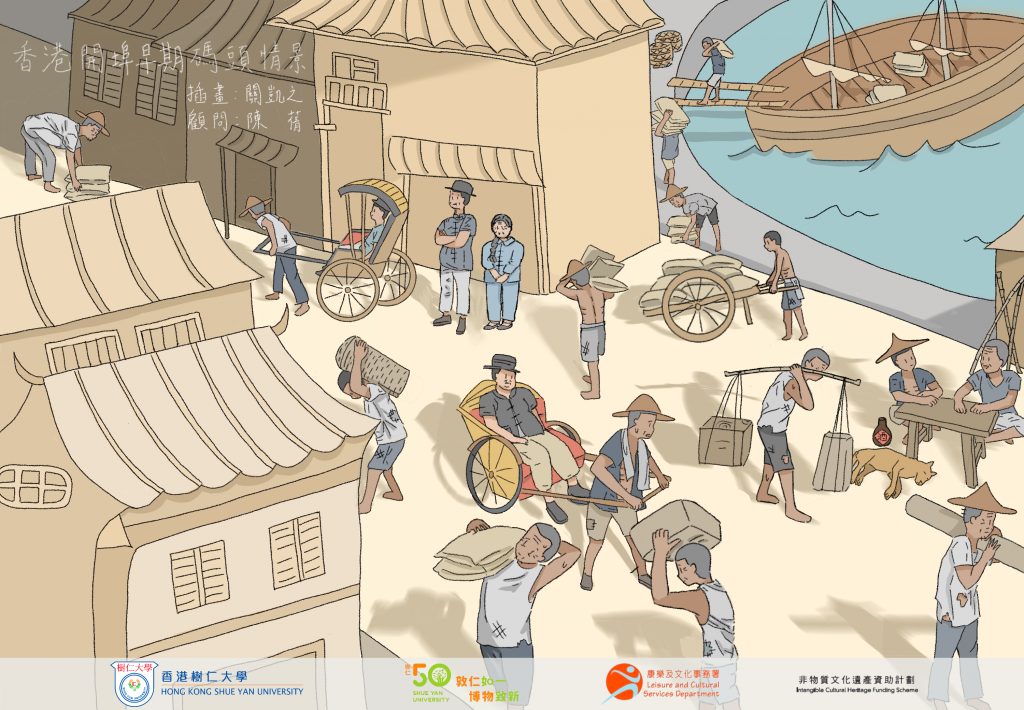
佛教三角碼頭的苦力
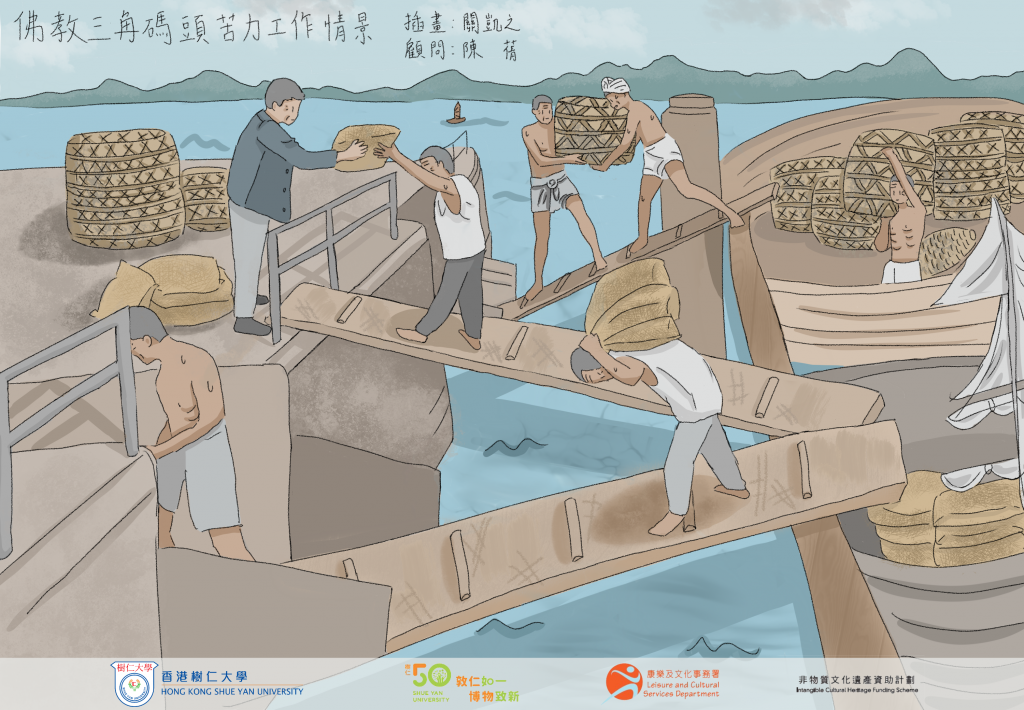
五十年代尖沙咀碼頭廣東道的繁華
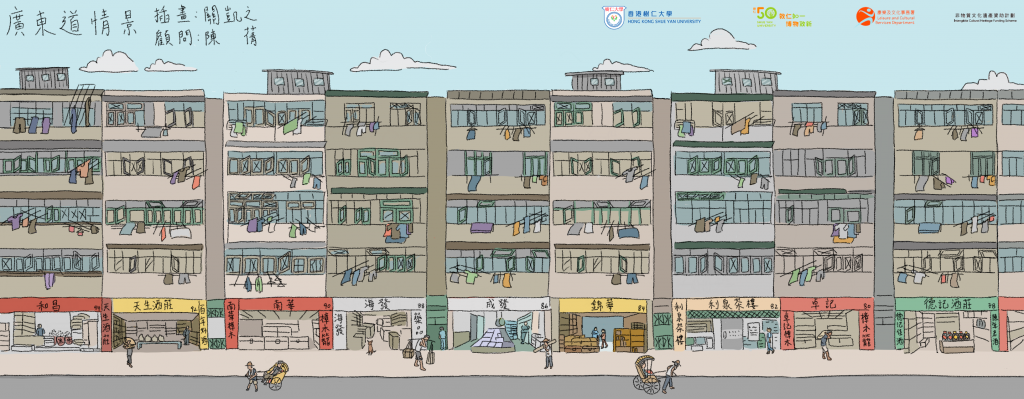
潮籍盂蘭勝會與香港早期轉口貿易港的發展
盂蘭勝會所呈現的社區精神
籌辦盂蘭勝會需要動員社區上大量的人力、物力,街坊義工用不同的方法募捐善款。除了祭神超幽之外,也會派米給大眾。儀式結束之後,社區居民一起用膳,慶祝功德圓滿。
共膳情景
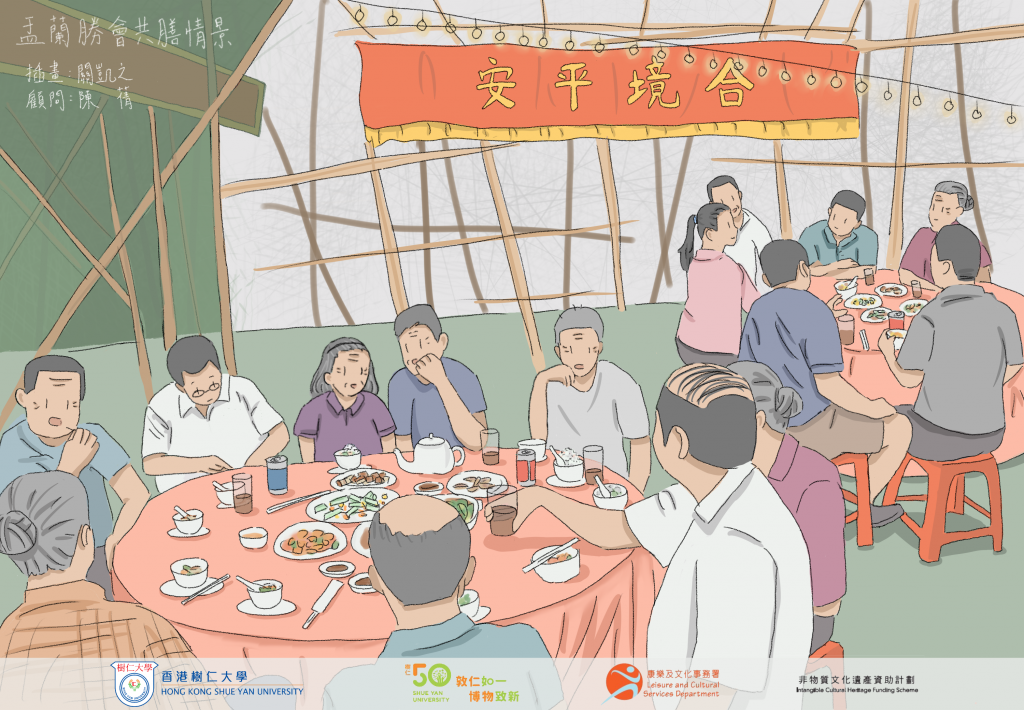
盂蘭勝會所呈現的社區精神
Documentary
香港潮籍盂蘭勝會:集體回憶與社區精神
香港潮人盂蘭勝會漫畫和短片發佈會暨座談會
2021年6月12日
多媒體香港盂蘭勝會:過去、現在、未來
2022年5月28日
香港樹仁大學近年積極推動「數碼人文」,重塑博雅教育,致力開展不同類型的研究項目。由仁大學術副校長、社會學教授陳蒨博士主理的「三個潮籍盂蘭勝會:研究、傳承與推廣計劃」,透過利用數碼科技結合人文社科研究成果,製作出香港首個虛擬的非物質文化遺產博物館「國家級非物質文化遺產虛擬博物館:疫情下佛教三角碼頭盂蘭勝會的變奏」。
虛擬博物館結合數碼技術進行知識轉移,包括360影片,和使用攝影測量法(Photogrammetry)拍攝數千張相片後製作而成的3D模型。參觀者可透過戴上VR頭戴式裝置或使用電腦進入博物館,並且穿梭時空到2021年體驗社區內盂蘭勝會場景,他們可看到當日臨時搭建的神壇場景及於場內走動的人,又會聽到當時進行法事期間的人聲、誦經聲等,令參觀者有置身其中、得到田野研究的考察體驗。
傳承精神命脈,活化非遺文化 中華文化遺產和國際非遺交流系列活動
2022年11月23日至28日
「傳承精神命脈 活化非遺文明」中華文化遺產和國際非遺交流系列活動,於11月23日至28日在香港中央圖書館舉行,由仁大學術副校長、社會學教授陳蒨博士主理的「國家級非物質文化遺產虛擬博物館:疫情下佛教三角碼頭盂蘭勝會的變奏」項目有幸參展,以虛擬博物館的方式展示香港盂蘭勝會作為國家級非物質文化遺產 的歷史面貌。
以沉浸式的體驗為公眾提供一個可以感受節日氣氛的虛擬時空,以助公眾眾認識香港本地的優秀文化,深化對傳承和創新非物質文化遺產的了解。
創科博覽2022
2022年12月12日至22日
由仁大學術副校長、社會學教授陳蒨博士主理的「國家級非物質文化遺產虛擬博物館:疫情下佛教三角碼頭盂蘭勝會的變奏」被專家學者組成的評選委員會評選為25項香港具有標誌意義的本地科研成果之一,在創科博覽2022展出。
展覽中公眾可以借用虛擬實景裝置或電腦進入博物館,欣賞有關盂蘭勝會的歷史圖片和漫畫,閲讀舊報紙的報導以及與同樣身處館內的參與者討論分享深化對地方文化的認識,加強對傳承與和創新非物質文化遺產的了解。
穿梭時空:虛擬實境盂蘭勝會導覽 公眾發佈會曁座談會
2023年7月15日
「虛擬實境盂蘭勝會導覽」公眾發佈會暨講座,「三個潮籍盂蘭勝會:研究、傳承與推廣」計劃主持人、學術副校長兼社會學系陳蒨教授致辭時表示,「虛擬盂蘭勝會導覧」著重知識轉移,希望透過數碼技術,幫助年輕人了解盂蘭文化。
「虛擬盂蘭勝會導覽」的製作過程,重視當地組織者和參與者的聲音,將盂蘭組織者視為「虛擬盂蘭勝會導覽」的社區合作夥伴,聽取他們提供的慶祝活動詳細信息、節日的歷史知識、昔日照片以及對盂蘭勝會的個人記憶等,有助確定虛擬導覽中捕捉和呈現的內容和影像,亦展示社區、基層在面對許多突如其來的變化時所展現的民間智慧,突顯非物質文化遺產的鮮活性和流動性。
暨南大學香港考察團訪問及參觀虛擬博物館
2023年8月21日
暨南大學香港考察團為聯合國教育、科學和文化組織(UNESCO)「世界傳統手工藝︰傳承與創新」教席工作的項目之一,由暨南大學新聞與傳播學院副教授,網絡與新媒體系主任谷虹老師帶領約30名師生,通過採訪及影像記錄香港的非物質文化遺產(非遺)項目,了解香港非遺領域的發展,藉此加強內地及香港在非遺保護、傳承及學術研究方面的互動交流。
2023盂蘭文化節
2023年9月4日至5日
香港潮屬社團總會主辦的「2023盂蘭文化節」於9月1日至3日在維多利亞公園舉行,香港樹仁大學學術副校長、社會學教授陳蒨博士以「香港佛教三角碼頭 街坊盂蘭勝會虛擬導覽」項目參展,期望透過創新科技和潮流文化,展現盂蘭文化的時代魅力。
公眾可借用虛擬實景裝置或電腦進入虛擬導覽的世界,以沉浸式的體驗感受節日氣氛,體會潮人盂蘭文化中感恩及孝慈的意義,幫助公眾認識香港本地的優秀文化,深化對傳承和創新非物質文化遺產的了解。
Chaozhou Hungry Ghosts Festival in Hong Kong
United Nations Educational, Scientific and Cultural Organization (UNESCO)
Intangible Cultural Heritage
Contributor: Selina Ching Chan (Hong Kong Shue Yan University)
Due to the Covid-19 pandemic in 2020, all kinds of public gatherings were suspended in Hong Kong. All the traditional celebrations of the Chaozhou Hungry Ghosts (Yulan) Festival – Hong Kong’s ICH, and China’s national-level ICH – in the conventional public spaces were cancelled because the government forbade crowd gatherings and refused to release these sports grounds for the festival. Chaozhou operas were abandoned due to crowd control and travel restrictions on performers from Mainland China. Similarly, there was also a shortage on religious specialists for rituals because they were mostly from Mainland China.
In the pandemic, organizers at different districts tried very hard to maintain the traditional festival rituals in order to purify the communities and pray for ……
For full publication:
https://ich.unesco.org/en/living-heritage-experience-and-covid-19-pandemic-01124?id=00381
“The Chinese Diaspora of Southeast Asia and Hong Kong”
Funded by Hong Kong Museum of History, HKSAR Government Amount of Grant: HK$646,800
Project Investigator: Dr. Yew-foong Hui
Project Description:
The Chinese have been migrating to different parts of Southeast Asia since 111BC for political and economic reasons. However, it was only in the 19th to 20th centuries that large numbers of Chinese workers and merchants flocked to different parts of Southeast Asia. Hong Kong and Singapore played an important role in this migratory wave as British colonial ports that facilitated the movement of Chinese populations between South China and various parts of Southeast Asia. Moreover, as a cosmopolitan city on the doorstep of China, Hong Kong has had close connections with Chinese communities in Southeast Asia throughout the mid-19th to 20th centuries, and they continue to be relevant and active today. This project examines the history of Chinese migration to Southeast Asia, highlighting the connections between these Chinese communities and Hong Kong.
“Festivals in Hong Kong: Past and Present”
Funded by the Hong Kong Museum of History, HKSAR Government Amount of Grant: HK$649,478
Project Investigator: Prof. Selina Ching Chan
Project Description:
This research aims to explore the relationship between festivals and the historical development of Hong Kong, and analyze how the performance of festivals reveals the colonial political background and the historical characteristics of the immigrant society. It examines how various festivals have been performed in the era of fishing and farming, entrepot trading economy, industrialization, globalization, and reunification of Hong Kong to China. It also investigates how festivals appear in urban public spaces in new forms and with new meanings at various times, revealing the changes in the daily lives of Hong Kong people and their diverse and complex identities. It examines how the performance of various festivals today embodies the unique hybrid culture with reference to the changes in traditional patriarchal society, the intermixing of different types of cultures brought by the immigrants to Hong Kong, the impact of globalization, as well as the influence of consumerism.
“Edible Heritage and Sensory Heritage Making in Chinatown and Little India (Singapore)”
Funded by the National Heritage Board (Singapore)
Project Description:
This project seeks to document and analyze foodscapes and sensory heritage in Singapore. It does so with particular reference to the case studies of Chinatown and Little India in reflecting how everyday memories and gastronomic experiences serve as avenues through which sensory heritage may be delineated and constructed. Through its research, the project hopes to be able to make pertinent contributions towards the study of intangible cultural heritage, social memory and food studies in Singapore.
“Mapping Diasporic Networks: The Case of the Indonesian Chinese”
Project Description:
This project maps out the migratory paths of Medan Chinese and investigates how they are connected and organized across national boundaries. This part of the Chinese diaspora, distributed across Indonesia, China, Hong Kong and Taiwan, continues to be connected through kinship, alumni or hometown association ties. Through multi-sited ethnographic research in Indonesia, China, Hong Kong and Taiwan, this project will study these ties and ask if they represent a kind of Chinese transnationalism that can persist across generations and geographical regions.
